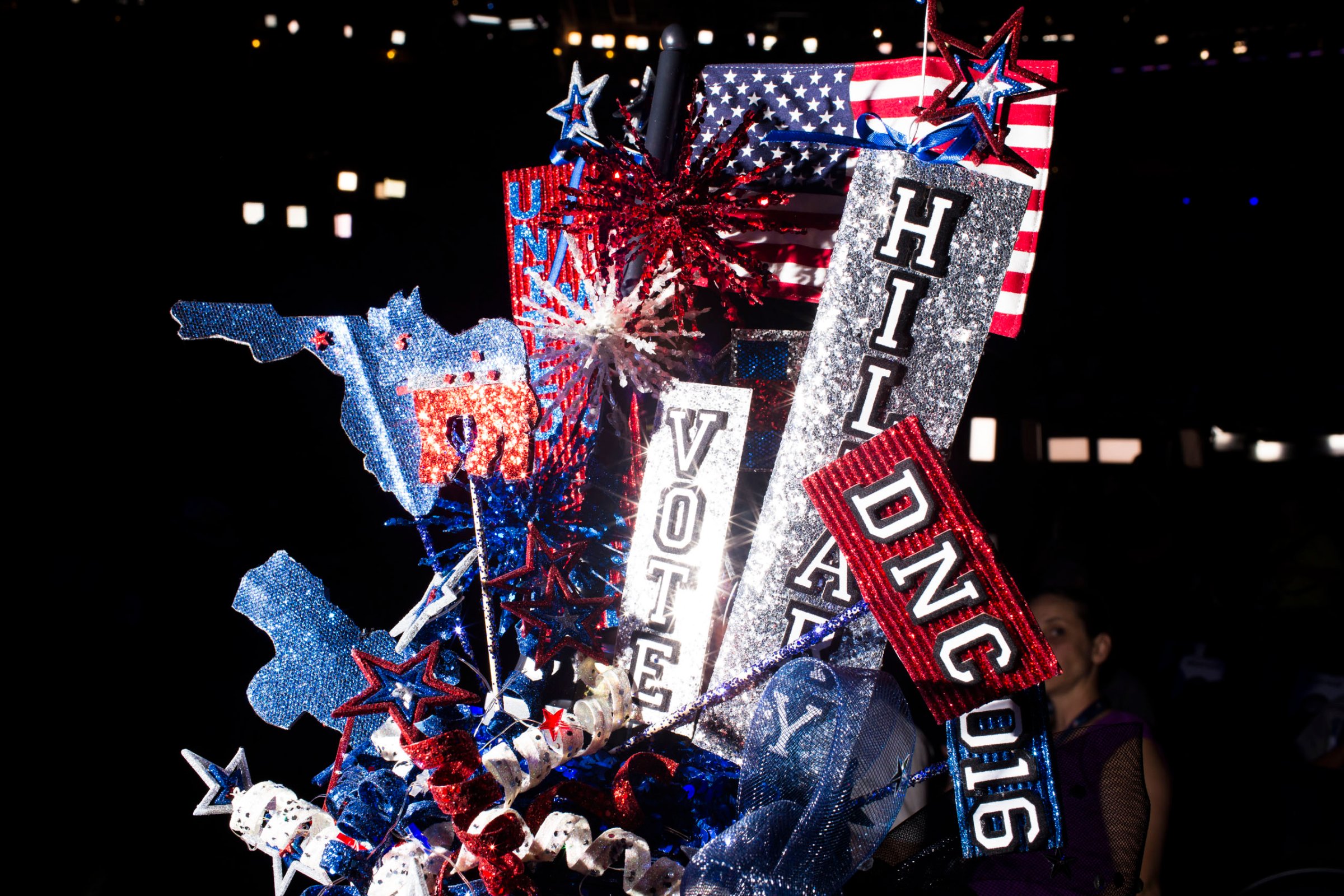
Heather Podesta wore a scarlet letter “L” to the last two Democratic National Conventions—a not so subtle protest over the Barack Obama’s ban on lobbyists like her donating money to his cause.
Podesta’s scarlet letter is gone this week, because Hillary Clinton and the Democratic National Committee have lifted the ban.“Things have already changed,” said Podesta, while mingling at a brunch put on by her firm at the swanky Philadelphia restaurant Fork on Tuesday with members of Congress, the Obama Administration, and, yes, lots of lobbyists.
“During Obama Administration I couldn’t give money to the Democratic National Committee, the President, and if the Democratic Senatorial Campaign Committee was having an event with him I couldn’t go even though I was a maxed-out donor,” she continued. “This year, I’m helping to raise money for Hillary. I’ve known her a long time. I’m really excited about her campaign. I raised for her in 2008 and I’m ready for her to go all the way. So my money is now good.”
Podesta is just one of a legion of lobbyists coming out of the proverbial closet this convention, free to raise money, support candidates and be proud of it for the first time in nearly a decade. For many influence brokers, the distinction is an important one. Facing a fundraising shortfall after Congress ended public funding for the conventions, the Democratic National Committee eased the ban in 2012 to allow corporate funding of external convention events. That led to lobbyists and private industry largely funding much of the 2012 Democratic convention.
Campaign finance reformers have watched the change happen with dismay. “The stricter rules regarding lobbyists that the Obama administration and Democratic Party first put in place have been eroded and there has been a lack of effort to enact new rules, so this is not surprising,” said Lawrence Noble, general counsel for the Campaign Legal Center. “In fact, the conventions have become a stocked pond of local, state and federal officials for lobbyists to fish in.”
Tony Podesta, Heather’s ex-husband and fellow lobbyist, says the shift in rules from the conventions in Charlotte and Denver have only led to changes in the amount of money he spends. “There was no ban having parties in 2012,” he said, at his own swanky brunch at Barbuzzo on Monday morning. “The ‘lobbyist ban’ meant that I couldn’t buy Obama T-shifts. That made the administration seem a little crazy, to say I couldn’t buy a T-shirt for my niece and nephew.” He is the brother and former business partner of Clinton campaign chairman John Podesta. T-shirts and official campaign swag are still considered direct contributions under Federal Election Commission guidelines.
In February, the restrictions were further eased to allow lobbyists to directly raise money for the various Democratic committees, the convention and any events that don’t directly involve President Obama, Vice President Biden or their wives. The move was controversial at the time as it was supported by former secretary of state Hillary Clinton. Her rival, Vermont Sen. Bernie Sanders, opposed the change.
Some lobbyists still regret how maligned their profession became in the Obama years. “The Obama Administration made a mistake with that lobbying ban because some of the smartest most talented people who wanted to help move his agenda forward couldn’t do it,” says Gloria Dittus, chair of Story Partners and a Republican lobbyist who this year is supporting Clinton. “Granted they helped on the outside but they could’ve done more on the inside.”
Anecdotally, convention goers have noticed a bigger business presence in Philadelphia than was seen in Charlotte. “I’m certainly running into a lot more people as compared to 2012,” says Stephanie Cutter, who ran communications for Obama’s reelection, looking around the room at Heather Podesta’s brunch, “but it feels the same.”
Both Dittus and Heather Podesta agreed that there is a more prominent business presence in Philadelphia for Clinton than there was in Cleveland last week for Donald Trump’s Republican National Convention. “There were fewer executives in town at the Republican convention, but the business community is present at both,” said Heather Pedesta, who held one brunch in Cleveland and two in Philadelphia to accommodate demand. Her clients include Home Depot, Red Bull and Cigna.
Reformers have begun a debate over what the change in policy will mean, if Clinton wins the White House in November. “We do not believe this mistaken move from the Democratic Party is a harbinger of how a Clinton administration would handle revolving door issues,” said Robert Weissman, president of another watchdog group, Public Citizen. “The party platform contains a powerful commitment to ‘crack down on the revolving door between the private sector—particularly Wall Street—and the federal government,’ and candidate Clinton has made similar commitments. The Obama administration made some important progress in addressing revolving door issues, and we expect a Clinton administration to go further.”
But Dittus sees a different future for all those talented lobbyists shut out of the Obama Administration. “I think the Clintons know how to find and pick the best talent and put them to work for the cause,” Dittus said. “They’re great at finding, grooming, and fielding talent. They’re going to tap a lot of great smart women and I’m really looking forward to that.”
Emails to the Clinton campaign for comment on this story went unanswered.
More Must-Reads from TIME
- Why Trump’s Message Worked on Latino Men
- What Trump’s Win Could Mean for Housing
- The 100 Must-Read Books of 2024
- Sleep Doctors Share the 1 Tip That’s Changed Their Lives
- Column: Let’s Bring Back Romance
- What It’s Like to Have Long COVID As a Kid
- FX’s Say Nothing Is the Must-Watch Political Thriller of 2024
- Merle Bombardieri Is Helping People Make the Baby Decision
Contact us at letters@time.com